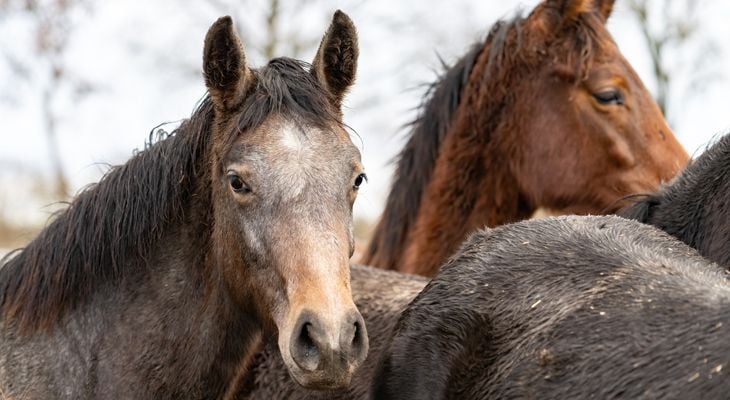
Horses are rarely prone to kidney or liver problems. Damage to both organs is much less common in horses than it is in cats or dogs. However, some aging horses do suffer from progressive and irreversible diseases of the liver or kidneys. Unfortunately, problems with these organs are seldom diagnosed until an advanced stage.
Conditions That Are Harmful to Kidneys
Less than 1 percent of horses will ever receive a diagnosis of kidney disease, according to a Purdue University study. The kidneys are extremely efficient organs which manage to function even under diminished capacity. In those rare cases in which an equine veterinarian diagnoses kidney disease in a horse, it’s often when the horse is being treated for another illness that is further stressing the kidneys.
Despite the good odds of your horse’s kidneys remaining healthy, it’s best to protect him from known kidney dangers. These include:
- Heatstroke and dehydration, both of which rob kidneys of the necessary pressure to separate water from blood. This damage can happen fast.
- An overdose of certain medicines and supplements, such as NSAIDS, antibiotics, vitamin K or vitamin D
- Hemorrhaging blood, causing blood pressure to drastically drop
- Shock, which slows blood flow to kidneys
- Bacterial infection, which causes inflammation and damages kidney cells
- Urinary obstruction, such as a tumor or kidney stone — given that horses rid their bodies of excess calcium through urination, stones can block the urethra and cause severe pain
- Colic, which places undue stress on vital organs and may send blood clots to kidneys
Signs of Kidney Problems
In the few cases in which a horse has kidney failure, waste products build up in the blood, eventually poisoning the body. Signs of kidney problems can be subtle and might be mistaken for many other conditions, including the natural aging process. Your horse may seem depressed or lethargic. He may not be as hungry or as interested in activity as usual. His coat can become dull.
Other signs include:
- Unusual changes in urination. Urine output may seem extreme compared to water input. It may be discolored, bloody, smell strongly and / or be very pale.
- Tooth problems, especially inflamed gums or dental tartar. These can indicate excess ammonia or urea circulating in your horse’s bloodstream.
- Loss of appetite and weight loss
- Fever
- Swelling throughout certain parts of the body
- High blood pressure
- Physical exhaustion and weakness
- Restlessness
Liver Trouble
Horses with certain pre-existing conditions are more likely to develop liver problems. These include growths and tumors, toxicity from certain plants — such as ragwort and fiddleneck — bile duct infection, some diseases, a twisted liver, a blocked vein to the liver or biliary stones.
If your horse has acute liver failure, she will probably become confused and jaundiced. If the liver problem is chronic, the most common symptoms are light sensitivity on white parts of skin and weight loss. Horses with either type of liver problem may experience difficulty eating or breathing and gastric impaction — that is, food staying in the stomach rather than moving through the digestive system.
Behavioral changes may accompany these physical symptoms. Your horse may get irritable and be hard to handle. Usually, three-quarters of the liver are affected before symptoms are detected.
Equine veterinarians know how best to manage liver and kidney problems through proper nutritional balance and hydration. If your horse is showing any signs of possible liver or kidney insufficiency, call our office today, so we can help you identify the problem and offer appropriate treatment options.

